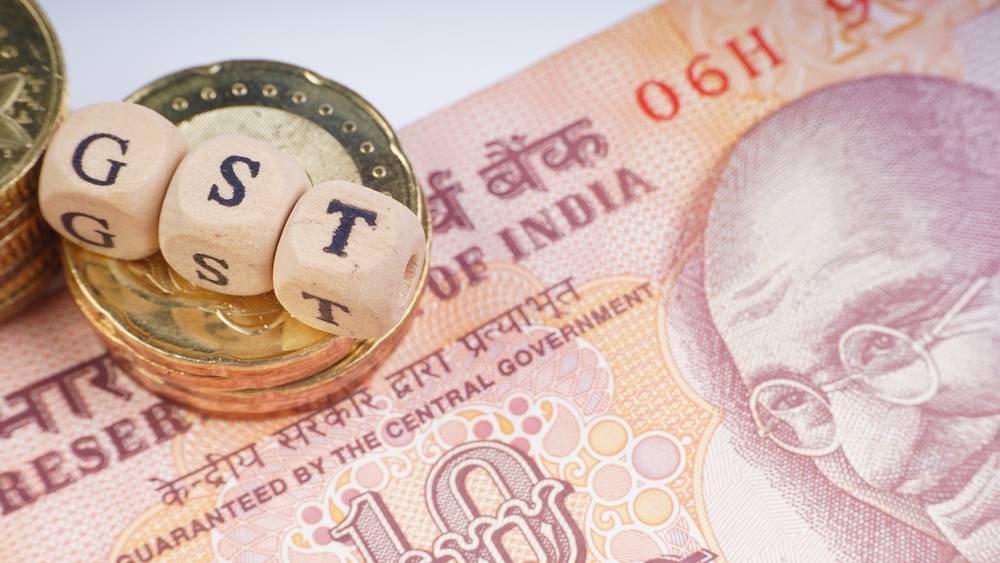 Updated on: December 16th, 2024 1:00 PM
Updated on: December 16th, 2024 1:00 PM
Advance Ruling for Unregistered Dealers
The Finance Act of 1993 first brought forth the scheme of Advance Rulings, which came into effect the very same year. An advance tax ruling is a more precise version of the tax laws implemented. An advance ruling as such is often requested by a taxpayer when the individual is unsure and uncertain about certain provisions under the various tax laws. Advance ruling under income tax is accessible to ensure that non-residents are well aware of their income tax obligations. This helps them to plan their income taxes and avoid any disputes. This article talks about the procedure for requesting Advance Ruling for Unregistered Dealers. Know more about GST Advance Ruling.No Late Fee for GSTR-1 & GSTR-3B Return
The biggest relief extended to small business by the 31st GST Council is the waiver of late fee for filing GSTR-1 and GSTR-3B return. The GST Council has announced: “Late fee shall be completely waived for all taxpayers in case FORM GSTR-1, FORM GSTR-3B &FORM GSTR-4 for the months/quarters July 2017 to September 2018, are furnished after 22.12.2018 but on or before 31.03.2019.” Thus, filing of Form GSTR-1, GSTR-3B and GSTR-4 will not attract any late fee penalty until 31st March 2019.GST Annual Return Due Date Extended
All entities having GST registration are required to file GST annual return in form GSTR-9. The due date for filing GST annual return is usually 31st December of each year for the financial year ended on 31st March of the same calendar year. As GST is newly introduced in India, the Government has decided to extend the due date for GST annual return filing to 30th June 2019. The due date for filing GST annual return was originally extended upto 31st March 2019, which has been further extended to 30th June 2019 by the GST Council.Advance Ruling (FORM ARA 01)
An application for Advance Ruling can be submitted by any individual, regardless having GST registration or not, for obtaining advance ruling under the CGST Act. An individual may request for advance ruling for the following aspects by furnishing the application and a prescribed fee:- Classification of any goods and/ or services.
- Applicability of an intimation issued under the provisions of this Act.
- Determination of value and time of supply of goods and/ or services.
- Admissibility of the Input Tax Credit (ITC) of tax paid or deemed to have been paid.
- Determination of the obligation to pay tax on any goods and/ or services.
- Whether the applicant is required to be registered.
- Whether any specific activity done by the applicant concerning any goods and/ or services sums up to an amount or results in a supply of goods and/ or services, within the meaning of that term.
Application Procedure for Unregistered Dealers
The following steps have to be followed to register for the provision of advance ruling, in addition to the remittance of the requisite fee and submission of the FORM GST ARA-01: Step 1: Visit the official GST portal of the Government. Step 2: Select the option of Services, then click User Services and follow the same on the Generate User ID for Advance Ruling option. Step 3: Once the New Registration for Advance Ruling page has been displayed, select the option among Resident and Non-Resident. Complete the details in the fields provided such as PAN of the Business, Legal Name, Details including the address of authorized signatory. For Non Residents, PAN is not mandatory. Step 4: Once the details are completed, enter the captcha and click on the Proceed icon. A Mobile OTP and Email OTP will be sent to the submitted mobile number and E-mail address. Step 4- Advance Ruling for Unregistered Dealers
Step 5: Verify the Mobile OTP and the Email OTP on the next page and click on the Proceed icon.
Step 4- Advance Ruling for Unregistered Dealers
Step 5: Verify the Mobile OTP and the Email OTP on the next page and click on the Proceed icon.
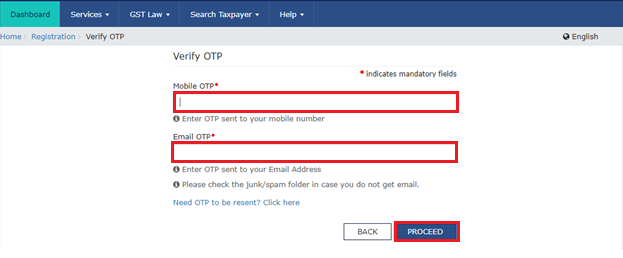 Step 5- Advance Ruling for Unregistered Dealers
Step 6: A message indicating successful registration will be displayed.
Step 5- Advance Ruling for Unregistered Dealers
Step 6: A message indicating successful registration will be displayed.
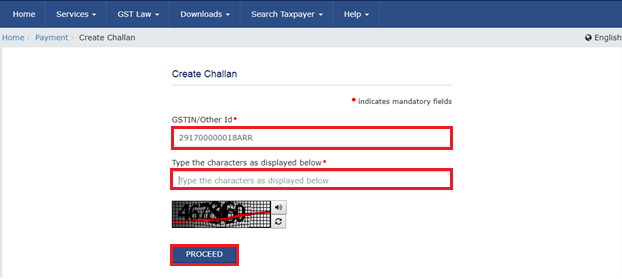 Step 8- Advance Ruling for Unregistered Dealers
Step 9: In the create Challan page, enter the amount as per the determined fee in the Fees column. Select the mode of payment and chose the Generate Challan icon. Reconfirm the GSTIN/ User ID once more.
Step 8- Advance Ruling for Unregistered Dealers
Step 9: In the create Challan page, enter the amount as per the determined fee in the Fees column. Select the mode of payment and chose the Generate Challan icon. Reconfirm the GSTIN/ User ID once more.
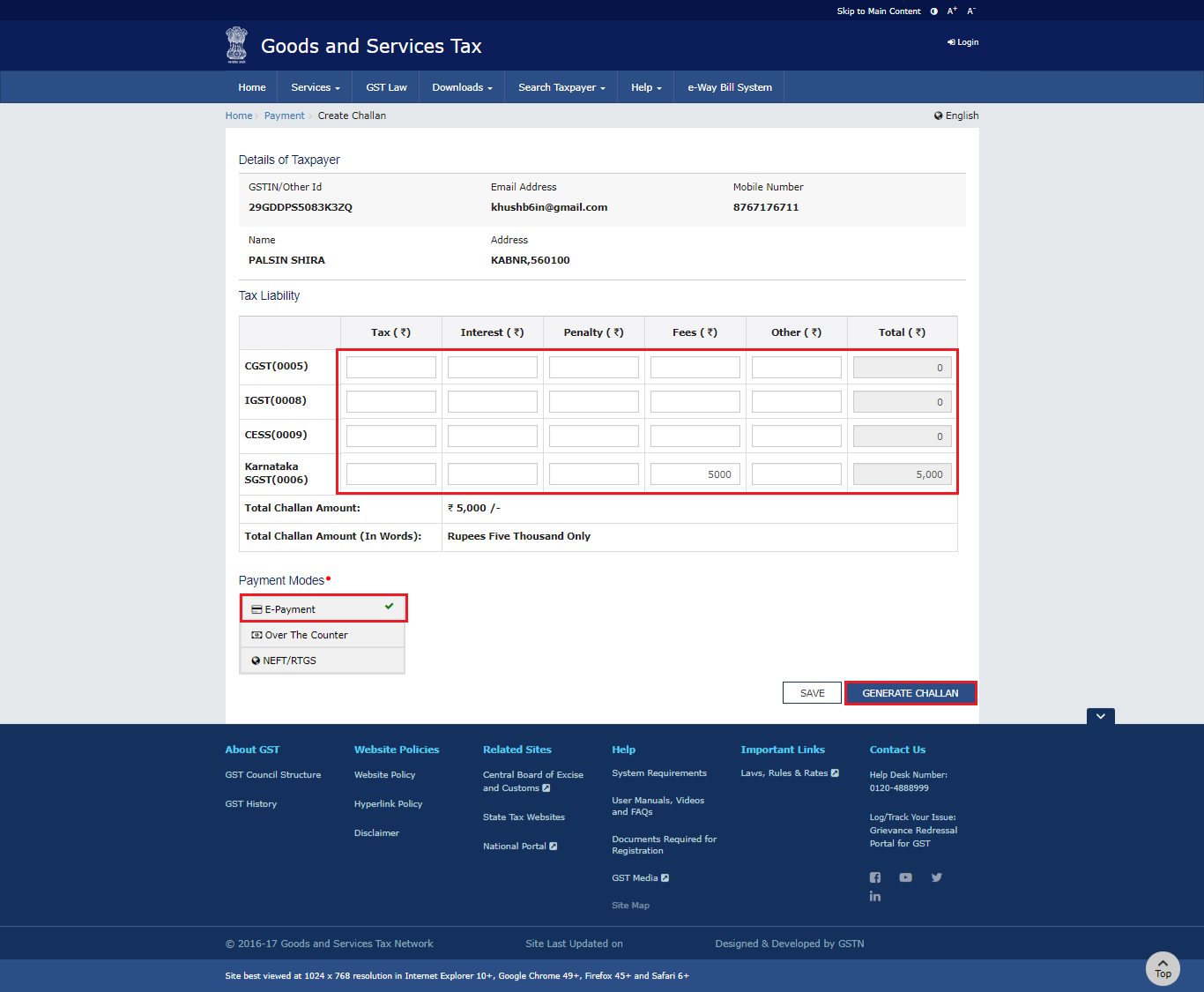 Step 9- Advance Ruling for Unregistered Dealers
Step 10: Re-enter the GSTIN/ Other ID for a reconfirmation and click on the Proceed icon.
Step 9- Advance Ruling for Unregistered Dealers
Step 10: Re-enter the GSTIN/ Other ID for a reconfirmation and click on the Proceed icon.
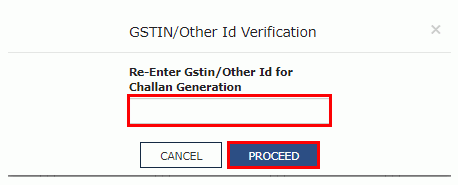 Step 10- Advance Ruling for Unregistered Dealers
Step 11: Once the User ID is entered successfully, the challan shall be granted. Chose the Make Payment option and proceed with the payment. After the payment is done, the applicant can track the payment using the Service option by clicking on the Payment option and then the Track Payment Status option.
Step 10- Advance Ruling for Unregistered Dealers
Step 11: Once the User ID is entered successfully, the challan shall be granted. Chose the Make Payment option and proceed with the payment. After the payment is done, the applicant can track the payment using the Service option by clicking on the Payment option and then the Track Payment Status option.
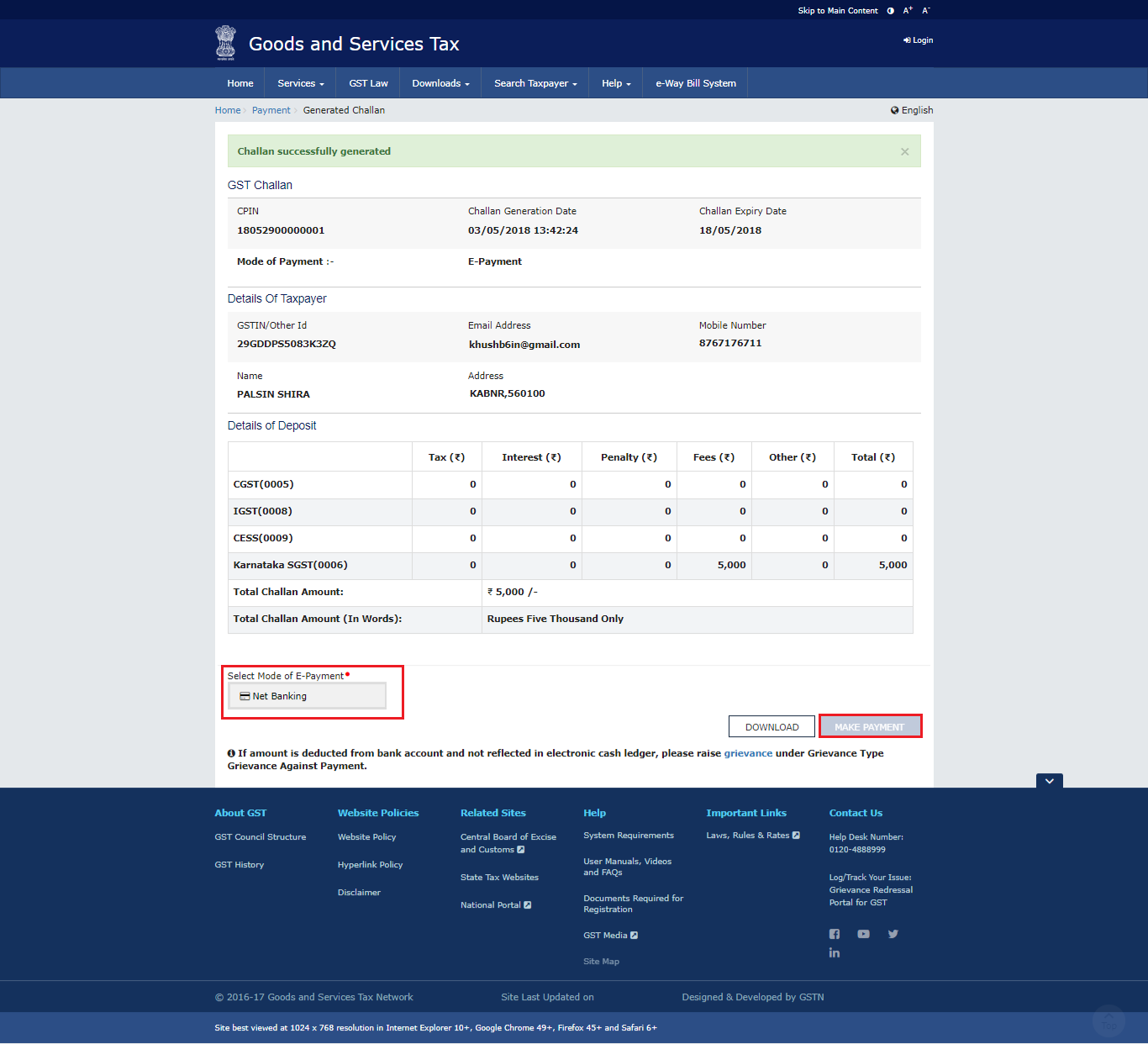 Step 11- Advance Ruling for Unregistered Dealers
Step 12: After the payment is done, chose the Downloads option, followed by the Offline Tools option and then the GST ARA 01 - Application for Advance Ruling option. A zip file containing the PDF copy of the Form GST ARA-01 Advance Ruling Application will be downloaded and can be accessed offline for printing purposes.
Step 11- Advance Ruling for Unregistered Dealers
Step 12: After the payment is done, chose the Downloads option, followed by the Offline Tools option and then the GST ARA 01 - Application for Advance Ruling option. A zip file containing the PDF copy of the Form GST ARA-01 Advance Ruling Application will be downloaded and can be accessed offline for printing purposes.
 Step 12- Advance Ruling for Unregistered Dealers
Step 13: Complete the details asked in the Form GST ARA-01 Advance Ruling Application. Note the Temporary ID created while asking for GSTIN Number or User ID. In the last field, enter the CIN number of Challan in the Payment Details field.
Step 14: After completing the form successfully, submit the form at the Advance Ruling Office in the State Authority. The concerned authority shall process the application further and inform the applicant about the same.
Learn more about GST Return Filing and seamlessly file your returns with IndiaFilings experts!
Step 12- Advance Ruling for Unregistered Dealers
Step 13: Complete the details asked in the Form GST ARA-01 Advance Ruling Application. Note the Temporary ID created while asking for GSTIN Number or User ID. In the last field, enter the CIN number of Challan in the Payment Details field.
Step 14: After completing the form successfully, submit the form at the Advance Ruling Office in the State Authority. The concerned authority shall process the application further and inform the applicant about the same.
Learn more about GST Return Filing and seamlessly file your returns with IndiaFilings experts!
Popular Post

In the digital age, the convenience of accessing important documents online has become a necessity...

The Atalji Janasnehi Kendra Project that has been launched by the Government of Karnataka...

The Indian Divorce Act governs divorce among the Christian couples in India. Divorce...

When an individual has more than a single PAN card, it may lead to that person being heavily penalised, or worse,...

Employees Provident Fund (PF) is social security and savings scheme for employee in India. Employers engaged...


